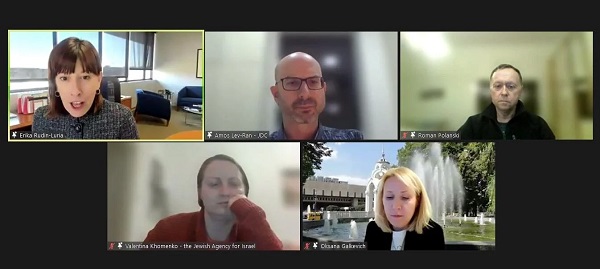Federation's Ukraine Update Includes $3.3 Million for Relief
COURTNEY BYRNES | STAFF REPORTER
Article reprinted with permission from Cleveland Jewish News

Jewish Federation of Cleveland President Erika Rudin-Luria, from top left, moderates a briefing on Ukraine April 12 with representatives from The Jewish Agency for Israel and the American Jewish Joint Distribution Committee.
Over 100 people tuned in to hear from representatives from The Jewish Agency for Israel and the American Jewish Joint Distribution Committee during the Jewish Federation of Cleveland’s April 12 briefing on Ukraine.
Federation President Erika Rudin-Luria moderated the event as Amos Lev-Ran and Oksana Galkevich from the JDC and Roman Polanski and Valentina Khomenko from The Jewish Agency shared the work their organizations were doing on the ground in Ukraine, bordering countries and in Israel.
Rudin-Luria began by giving an update on the Federation’s Ukraine Emergency Relief Fund and expressing the need for continued support as the war continues and long after it is over.
“Thanks to many of you on this call, we’ve been able to respond as Jewish Cleveland, and today we have received almost 1,200 individual gifts and have raised more than $3.3 million for Ukraine relief, which includes a $1 million generous matching grant from the Jack, Joseph and Morton Mandel Foundation,” she said. “This is supporting immediate needs in Ukraine, as well as needs in bordering countries.”
Lev-Ran, the JDC’s former Soviet Union division director for external relations, discussed how the infrastructure set up over the years by the organization in Eastern Europe allowed the JDC to respond to the war immediately and help Jews in need in Ukraine.
Through four field offices, community development programs that have engaged 25,000 to 30,000 Jews and providing aid to 37,000 elderly clients - 9,900 of which are Holocaust survivors – the JDC has been reaching many Ukrainian Jews even before the war.
“Before the war, we were reaching about a third of the 200,000 Jews of Ukraine, and this infrastructure is what is serving us today when we are responding to the critical needs,” Lev-Ran said. “When the war started, we very, very quickly shifted into emergency mode.”
Galkevich, the JDC’s deputy director of field operations in the Former Soviet Union, shared the humanitarian efforts of the JDC, as well as her own story as someone who was born and raised in Kharkiv, Ukraine and had family and friends still there.
“We’ve started sending humanitarian aid from Israel,” Galkevich said. “We’re buying medication here in bulk. We have sent, with tomorrow’s plane, nine tons of medications only. We have sent over 217 tons of food and other supplies.”
During the time for questions at the end of the briefing, she shared that monetary donations are the best way to help and that medicine is the most needed gift.
The two representatives from The Jewish Agency also shared connections to the region as Polanski was born in Ukraine and Khomenko was born in Russia. They spoke about the process of making aliyah and building a new life in Israel for Ukrainian Jewish refugees.
“The Jewish Agency main effort right now is in two directions: one is to enhance the security of the Jewish organizations in Ukraine ... another effort, which is very, very important is to get people to the border who are from bombed cities and then to get them to Israel,” Polanski, The Jewish Agency’s regional director of the Former Soviet Union, Eastern Europe and Germany, said.
Khomenko, The Jewish Agency’s director of aliyah young programs, said many Jews in Ukraine knew to reach out to The Jewish Agency due to past involvement in its summer camps and other programs. The Jewish Agency has launched “Aliyah Express” to expedite the process of helping Ukrainian Jewish refugees come to Israel and build their life there.
“We talk a lot about the aliyah process, we talk a lot about trying and helping people to make their way here,” Khomenko said. “But I think the major goal for Israel society and for The Jewish Agency and our partners here, is to make sure that all of these people will receive the support that they need and the absorption process will be good for them, and they will find their way here.”

![[image]](http://access.jewishcleveland.org/images/ad_cemetery_db.jpg)
![[image]](http://access.jewishcleveland.org/images/ad_new_to_cle.jpg)